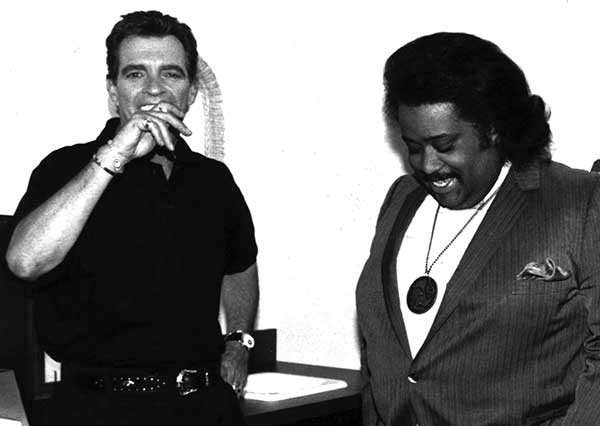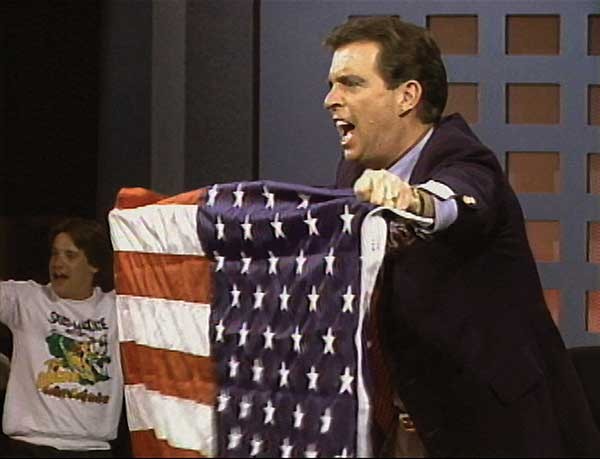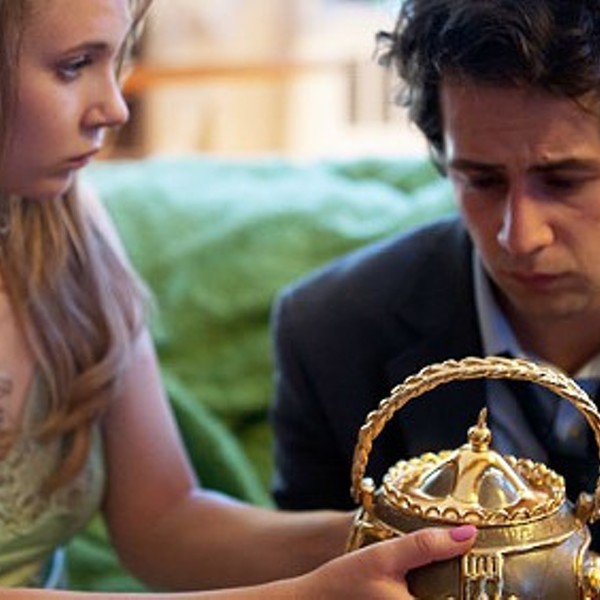
Bill O'Reilly is conciliatory, Sean Hannity is thoughtful, and Glenn Beck is downright rational—that is, when compared to 1980s talk show host Morton Downey Jr. The chain-smoking right-winger with the suitcase-sized mouth went from New York City talk show personality to national working-class hero on the strength of his populist stance and bullying onscreen antics.
The wild ride lasted only two years. Drunk on power, and believing his own hype, Downey eventually imploded in public. But, argue the Hudson Valley directors of the new documentary Evocateur: The Morton Downey Jr. Movie, Downey paved the way for the brash theatrics of today's breed of conservative TV pundits.
A one-time screening of Evocateur, featuring co-director (and Red Hook resident) Seth Kramer, will take place at Upstate Films Rhinebeck on August 4.
Kramer is one-third of Ironbound Films, the Garrison-based production company that spent several years on the film. He admits being a teen fan of "The Morton Downey Jr. Show," as were co-directors Daniel A. Miller, and Jeremy Newberger. As adults, and award-winning documentarians, the trio realized the perfect-for-film, sensationalistic quality of Downey's life. But as unapologetic liberal progressives, they saw the phenomenon as a cautionary tale.
The team felt, Kramer says, that it would be "on the one hand, hilarious to bring him back to the big screen and see him, once again, terrorize people. On the other hand, the film seemed to have the potential, for us, to communicate something perhaps more important: Because there are people today who are still practicing his act on television."
Over the course of research, Kramer and his colleagues discovered that Downey was far more complicated than his crass, braying persona might suggest. "It was just one surprise after the next," Kramer says. Downey, the son of a famous Hollywood crooner, was originally a liberal Democrat, a friend and booster of the Kennedys, and even a poet. In interviews with friends and contemporaries—among them, Gloria Allred, Bill Boggs, Pat Buchanan, and Alan Dershowitz—a portrait emerges of a man who reinvented himself more for a hunger for fame than from political conviction, churning up his studio audience into what Mayor Ed Koch called "a lynch mob."
Downey's biggest crusade came, uncharacteristically, with the case of Tawana Brawley, the Wappingers Falls teen who claimed to be the victim of a fearsome hate crime. Downey dissected the issue several times on his show, resulting in an on-stage battle and visceral television. Along the way, he made Reverend Al Sharpton a household name.
The most unsettling scene—among many—in Evocateur is when members of Downey's original production team discuss their roles in fanning the flames of the Brawley case (ultimately proven a hoax). With unsettling candor and a measure of shame, they talk about their quest for through-the-roof ratings, at any cost.
"It was still a keystone experience in all of their lives," Kramer says of the producers, "and they had a lot of baggage associated with it." (One of the former producers was Jim Langan, now editor of the Hyde Park weekly newspaper Hudson Valley News.)
The Ironbound Films directors saw Evocateur as "a psychological thriller about the rise and fall of this man," Kramer says. Jarring animation segments by British artist Murray John depict the internal demons of Downey. Daughter Kelly offers a clear-eyed look at her father, who went from family man to egomaniac, trading in her mother for a showgirl. Downey's widow refused to participate, Kramer says, when she realized this would not be a cinematic canonization but "a fair look at who he was, warts and all."
Evocateur screens on Sunday, August 4, at 3pm at Upstate Films in Rhinebeck. A discussion with co-director Seth Kramer follows the film.


















